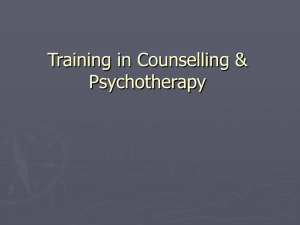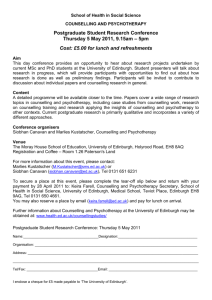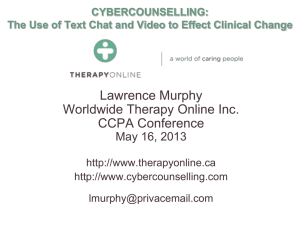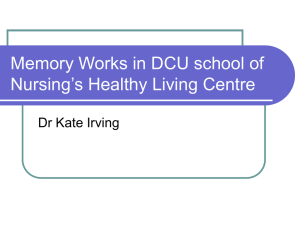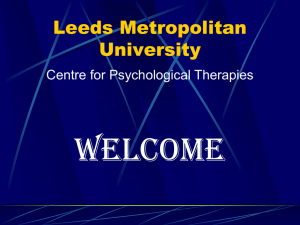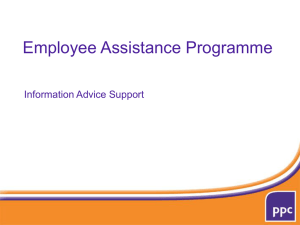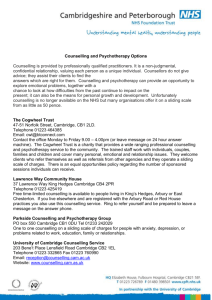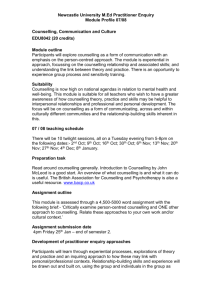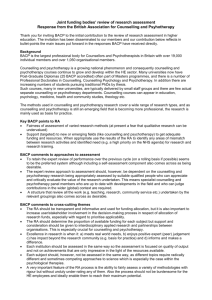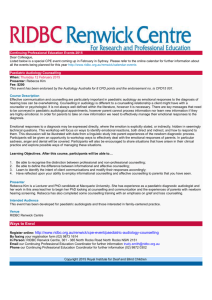Class in you - Leeds Beckett University
advertisement
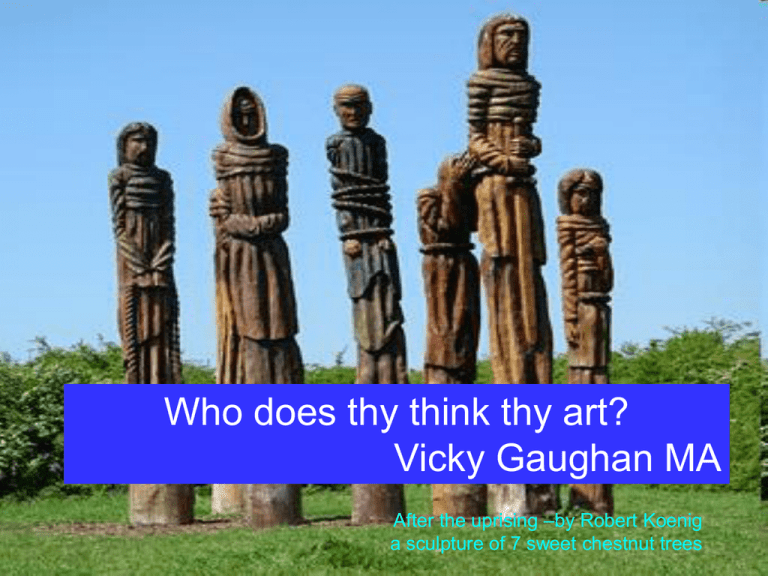
Who does thy think thy art? Vicky Gaughan MA After the uprising –by Robert Koenig a sculpture of 7 sweet chestnut trees Who do you think you are? ‘You’ve got to swing it, shake it, move it, make it, who do you think you are? Trust it, use it, prove it, groove it, show me how good you are, Swing it, shake it, move it, make it, who do you think you are? Trust it, use it, prove it, groove it, show me how good you are’ CLASS IN ME Self exploration revealed a BIGGER PICTURE We cannot separate the social from the psychic – Walkerdine (2007) ABSENT FRAMEWORK Class has the potential to evoke extremely charged and difficult emotions; it can be a determining aspect of early experience; some internalised aspects of class experience can be unconscious; and yet there appears to be an absence of frameworks for thought and discussion within the psychotherapy profession – Ryan (2006) CLASS IN YOU? A phenomenological study using grounded theory data analysis. The lived experience of seven Psychotherapists & Counsellors 60 – 90 minute interviews A WORD TO DESCRIBE THE PHENOMENA? Classism ‘overly dogmatic and overly focussed views = ism’ – Brislin (1993) CULTURE SHOCK Not understanding the rules Isolation & Confusion Feeling Shame Being Infantalised To ignore issues of class is detrimental Issacs (2006) CIVILISED OPPRESSION Subtle Concealed Intangible Distorting Privilege With a Smile… Harvey (1999) In my second year of training I kinda isolated myself… it’s difficult to have those issues ignored constantly… there were aspects of myself just absolutely shut down because it was not possible to have those conversations in any way. I feel very, very irritated… it’s very, very painful…and has left me feeling (emotion in her voice), I don’t know… left me feeling… erm… very disillusioned – Imla INTERNALISED OPPRESSION I think there’s this absolute blindness you know, that actually anybody can be sitting there feeling inadequate, inferior having their language undermined erm and the people in authority don’t see it. – Margaret AN ELITE ACTIVITY? ‘The counselling community’s failure to confront class inequalities and different experiences of class disadvantaged people (trainees as well as clients), results in counselling becoming an elite activity’ (pp. 113 – 114, Kearney 2003). CLASS IN YOUR PROFESSION Without Vision? Without Hearing? FAILING INSTITUTION? The innovative work of the last two decades on gender, race and sexuality within the psychoanalytic field has not been matched by equivalent attention to class. – Ryan (2006) Omission is logically a natural outcome of a greater culture of silence – Nelson et al (2006) Very few would have an understanding... it’s one thing having one level of understanding if one tutor understands, she may come from a working class background. It’s not enough…the institution isn’t permeated with understanding, it needs to be somewhere at the heart, the beating heart of the organisation…it’s not enough, it’s breadcrumbs, it’s not enough. One tutor or two tutors out of three or four years of training… there needs to be much more awareness of these kinds of issues – Imla CARDIAC ARREST Defibrillation (electric shock treatment for heart attack) of current counselling and psychotherapy training is called for to place class issues, to use Imlas’ words, at the ‘beating heart of the organisation’. THE FUTURE Boldly going… – C&P for social responsibility UKCP Diversity Equality Social Responsibility Committee (DESR) PCSR Economic Inequality/Class References: Kearney, A. (2003). Class and Counselling. In: Lago, C. and Smith, B. ed. Anti-Discriminatory Counselling Practice. London, Sage Publications, pp.109-119. Kearny, A. (1996). Counselling, Class and Politics: Undeclared influences in Therapy. Manchester, PCSS Books. Issac, M. (2006). Psychodynamic Counselling and Class. In ed.Wheeler, S. Difference and Diversity in Counselling: Contempory Psychodynamic Perspectives. Hampshire, Palgrave Macmillan, pp.156-167. Harvey, J. (1999). Civilised Oppression. USA, Rowan and Littlefield. Ballinger, L. Wright, J. (2007). ‘Does Class Count?’ Social Class and Counselling, Counselling and Psychotherapy Research. 7(3), September, pp.157-163. Anthias, F. (2005). Social Stratification and Social Inequality: Models of Intersectionality and Identity. In: Rethinking Class, Culture, Identities and Lifestyle, ed Divine, F. Savage, M. Scott, J. Crompton, R. Hampshire, Palgrave Macmillan, pp. 24 – 44 Nelson, M. Englar – Carson, M. Tierney, S. Hau, J. (2006). Class Jumping Into Academia: Multiple Identities for Counselling Academics, Journal of Counselling Psychology. 53(1), pp.1-14. Ryde, J. (2009). Being White in the Helping Professions: Developing Intercultural Awareness. London, Jessica Kingsley. Ryan, J. (2006). “Class is in you”: An Exploration of some Social Class issues in Psychotherapeutic Work, British Journal of Psychotherapy [Internet] 23(1) pp. 49-62 available from: Leeds Metropolitan University Library online [accessed 4/1/09]. Scott, J. (1990). Domination and the Arts of Resistance: Hidden Transcripts. New Haven, Yale University Press. Walkerdine, V. (2007). Class in the Consulting Room, Psychotherapy and Politics Ward, C. Bochner, S. Furnham, A. (2001). The Psychology of Culture Shock 2nd Ed. New York, Routledge.


